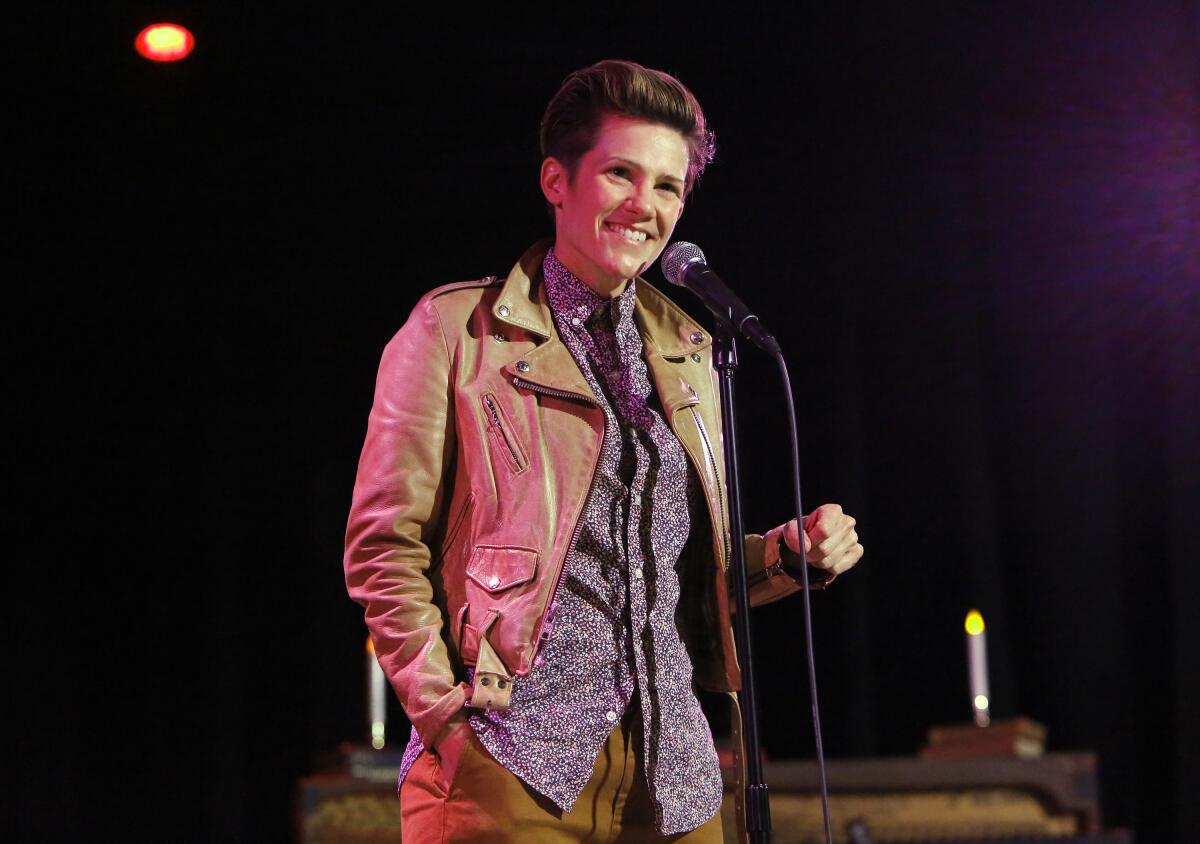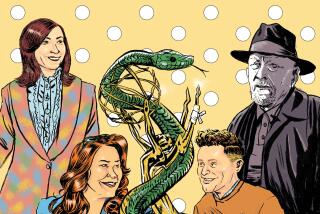Awards ceremonies have failed big lately. Can the new Podcast Academy break the curse?

Podcasts: Where can you listen to them? Anywhere podcasts are available!
But how do you know the best podcasts to try? Asdfjasdjfkasdkfdfasdfasdf.
On Sunday night in Los Angeles, the growing, ascendant but still-unruly podcast industry will livestream its most serious collective attempt at an awards ceremony. The Ambies, hosted in its inaugural run by comedian and podcaster Cameron Esposito, aspires to be for podcasts what the Emmys and the Oscars are for TV and movies: a recognition of the industry’s best by the industry’s best and a guide for would-be fans who just want a recommendation for something good.
The show is the brainchild of the newly created Podcast Academy, whose board of governors includes industry independents as well as executives from heavy hitters such as Amazon, Spotify, iHeartMedia and NPR, which also contributed funding. (The Ambies aren’t the industry’s first prominent awards show: iHeartMedia already runs its own version.) The Ambie trophy, a genderless figure in headphones holding up a microphone, has that winner’s heft associated with prestigious awards and dangerous blunt weapons.
“We definitely wanted something that winners would feel proud displaying on their shelves,” said Hernan Lopez, the founder and former CEO of Wondery, a Podcast Academy board member and the committee chair for the Ambies, after unboxing a trophy during an interview at a Soho Works conference room in West Hollywood. “It’s plated with gold.”
But these are troubled times for awards ceremonies as a concept. Ratings for the major televised awards shows are down. The Golden Globes’ host organization, the Hollywood Foreign Press Assn., has been riddled with so many allegations of ethical improprieties, unfairness and lack of racial representation that NBC won’t even air the show in 2022. The Oscars ended in humiliation this year when the ceremony shifted the final order of its awards to set up a potentially climactic posthumous best actor win by deceased “Black Panther” star Chadwick Boseman, only for the award to go to Anthony Hopkins, who was not present.
America loves to hate awards shows, especially when they go wrong, and they seem to go wrong a lot. Why create a new one?
The simplest explanation is that the podcast industry has finally gotten big enough, prominent enough and prestigious enough to risk the kind of trouble that can come with a big-tent award show. It’s a marker not solely of industry maturity but of industry ambition. There are just too many podcasts now, too many quality players in the game and far too many listeners to be gained with the hype that a credible award can generate.
“What we see in the research is that once people start listening to podcasts, they start listening to more and more and more, and they completely replace their radio listening experience. It’s just a matter of getting people exposed, and that’s what the Ambies can help with,” said Rob Greenlee, vice president of content and partnerships for podcasting company Libsyn, and one of the academy’s founding members and its first chairperson. “There isn’t really a Rotten Tomatoes that exists for podcasting.” (Except maybe the Apple podcast app’s star rating system, whose scores come from users, not professional critics.)
Steve Wilson, the chief strategy officer at podcasting company QCODE and one of the Podcast Academy’s nearly 1,000 members, said critical validation is a virtuous circle. “With that sort of mainstream credibility comes consumer audience, and with audience comes real revenue opportunities for creators and real revenue brings better and better content,” Wilson said. “You have high-quality talent sometimes who have wanted to go full-time in podcasting,” but without steady money, “it was difficult for them to quit their day jobs.”
After early conversations in late 2019, Lopez and other industry players started laying the groundwork for the creation of a new podcast academy and awards ceremony. Then came the unglamorous but critical work of organization-building. Bylaws usually don’t make news headlines, but when bylaws fail they can fail spectacularly. “I’m glad that we launched the organization in 2020, so we were able to start an organization already knowing that diversity was something we need to address head-on,” Lopez said.
Most entertainment consumers probably don’t spend their time worrying about the ways an awards show can go wrong on diversity and representation. There are a lot. The board making the rules could be disproportionately white or male. The artists creating work deemed eligible could be disproportionately white or male. The judges picked to select nominees could be disproportionately white or male. The voters eligible to pick the winners could be disproportionately white or male. Add it all up, and the winner is...
It may not come as a surprise that the Ambies’ founders studied the rules of the Oscars, the Emmys and the Grammys to see what seemed to work and what didn’t. The Academy hired a diversity, equity and inclusion consultant before it even settled on a logo, at the urging of a founding group of board governors including independent podcast consultant Rekha Murthy.
“This is somebody who is present at our meetings with us, who models inclusive behavior and helps us think more actively on the spot about choices we’re making,” Murthy said, adding that the academy was also “really intentional from the beginning of [ensuring] a diversity of background and professional expertise for the makeup of the board.”
Having not been part of a similar association before, Donald Albright, president and co-founder of the independent podcasting company Tenderfoot TV in Atlanta, agreed to join the board of governors. He became chairperson in 2021 after Greenlee’s term ended.
“What I was thinking was, at least my voice would be represented, not just as an independent podcaster, but as a Black male as well, making sure that underrepresented voices were heard,” Albright said. And then he set about recruiting members, even sponsoring memberships for some. “I wanted to make sure that Black podcasters felt that this was an organization for them, because the Black community is looking at award shows like, ‘Oh, here goes another [one] where we won’t be represented.’ Or, ‘We have to have our own awards show because they don’t understand what’s important to us.’”
The academy also recruited more than 100 “blue-ribbon” judges from the industry, who are also Podcast Academy members, to each listen to an average of more than 30 hours of award entrants to select nominees in 23 different categories, such as best interview podcast, best sports podcast, best true-crime podcast and best fiction podcast, with the winners to be voted on by academy members, according to Lopez.
Waiting for the outcome of the judging process was an uneasy time for some of the academy’s founders — here was the first point where recruitment efforts ended and actual critical judgment started happening.
“I’ll tell you about my fears — when we sent all the entries to the blue-ribbon panelists and were waiting really anxiously to see which shows got nominated,” Lopez said. “Fortunately, when the nominees came out, fully one-third of the shows had at least one host who was a person of color, and so we were really proud.”
One of those nominees, for podcast of the year, is “Say Their Name” from DCP Entertainment, a Black-owned independent production company, which tells the stories of Black people killed by police and fundraising for their families.
“Just even being nominated is huge. We’re up against some of the top companies not only in podcasting but media at large — iHeartRadio, Wondery, L.A. Times,” said Chris Colbert, CEO and Founder at DCP Entertainment. (The Times’ “Chasing Cosby” podcast is also nominated for podcast of the year.)
With the attention from the nomination, “now we’re able to expose so many more people to these stories,” Colbert said, adding of the major corporate names on the academy’s board: “Being nominated then puts me on their radar, so now that opens opportunities.”
One of the biggest tensions of the whole Ambies project, however, was about maintaining a balance of power between the independent podcast shows and companies who built the industry and the major corporate players who have started gobbling up talent, shows and companies and who seem poised to dominate the medium’s future. It’s a reasonable concern, according to experts.
“One pattern that recurs throughout the history of cultural awards is that an award may be founded to honor independent, non-mainstream, alternative artists and works, but then over time kind of migrates toward mainstream tastes and ends up mostly amplifying the power and influence of well-established firms and institutions,” said James F. English, a professor at the University of Pennsylvania who has studied major awards.
Not everyone was satisfied by the roster of nominees. Independent podcast producer, audio editor and voice actor Ned Donovan of New York thought too many of the finalists came from companies who were among the founding financial sponsors of the creation of the Podcast Academy. But he didn’t think the outcome was due to favoritism or malfeasance.
“Are those the best shows in the world? They might be,” Donovan said. “I do think that the optics of it are really not great for a company that wants to represent all podcasters, not just the top of the top.”
Donovan also thought the academy’s rule of creating a $100 fee to enter each award category disfavored independent shows who might have entered in fewer categories compared to bigger companies that might have the budget to submit to as many categories as possible, which would mean “they had more ballots in the box for the judges to consider and critique.”
Podcast Academy executive director Michele Cobb rejected those criticisms. “We got over 1,000 entries,” she said. “There’s 2 million podcasts out there. So there is a little barrier to entry in part because this is thousands and thousands of submitted hours to be judged. So to make it manageable, we have to keep that in mind.”
The Podcast Academy also has a rule in its bylaws to try to prevent the industry’s biggest companies from completely dominating the organization: the board of governors “must be composed of at least 40% by individuals who represent themselves as independent podcasting professionals.”
The organization has applied for tax-exempt status with the IRS as a 501(c)6 business league and is still awaiting a determination.
Once the awards pass this weekend, Murthy is looking forward to later in the year when some of the terms for the academy’s hand-picked founding governors start expiring and members start democratically electing the next generation of leaders and the organization starts taking on a life of its own.
“We’re going to have a really fun weekend,” Murthy said. “Then there’s this whole other level of work that begins, because people like me roll off [the board] next year.”
More to Read
The biggest entertainment stories
Get our big stories about Hollywood, film, television, music, arts, culture and more right in your inbox as soon as they publish.
You may occasionally receive promotional content from the Los Angeles Times.











